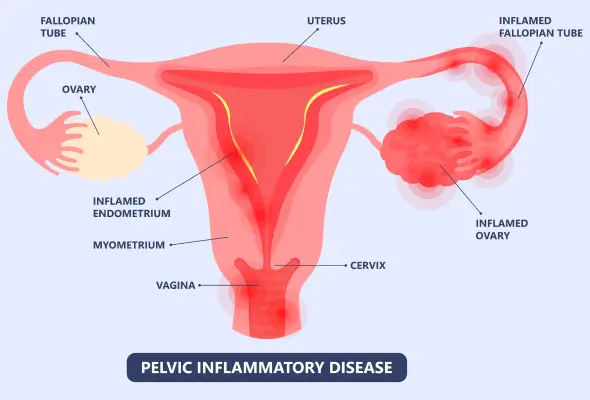-
Doctors
-
Specialities & Treatments
Centre of Excellence
Specialties
Treatments and Procedures
Hospitals & Directions HyderabadCARE Hospitals, Banjara Hills CARE Outpatient Centre, Banjara Hills CARE Hospitals, HITEC City CARE Hospitals, Nampally Gurunanak CARE Hospitals, Musheerabad CARE Hospitals Outpatient Centre, HITEC City CARE Hospitals, Malakpet
HyderabadCARE Hospitals, Banjara Hills CARE Outpatient Centre, Banjara Hills CARE Hospitals, HITEC City CARE Hospitals, Nampally Gurunanak CARE Hospitals, Musheerabad CARE Hospitals Outpatient Centre, HITEC City CARE Hospitals, Malakpet Raipur
Raipur
 Bhubaneswar
Bhubaneswar Visakhapatnam
Visakhapatnam
 Nagpur
Nagpur
 Indore
Indore
 Chh. Sambhajinagar
Chh. SambhajinagarClinics & Medical Centers
Book an AppointmentContact Us
Online Lab Reports
Book an Appointment
Consult Super-Specialist Doctors at CARE Hospitals

Abnormal Uterine Bleeding
Symptom, Causes, Diagnosis and Treatment
Abnormal Uterine Bleeding
Abnormal bleeding in the uterus is any irregularity in the menstrual cycle involving frequency, regularity, duration, and volume of flow outside of pregnancy. This condition affects up to one-third of women during their lifetime, with irregularities most commonly occurring at menarche and perimenopause.

Symptoms of Abnormal Uterine Bleeding
Abnormal bleeding in the uterus manifests in various ways, and women may experience different signs. The most common symptoms include:
- Heavy Menstrual Bleeding: Women may need to change their tampons or pads more than once an hour.
- Irregular Bleeding Patterns: Any unexpected bleeding outside the normal menstrual cycle warrants attention.
- Prolonged Periods: Menstrual bleeding that extends more than seven days is considered abnormal.
- Inconsistent Menstrual Cycles: Cycles that vary significantly in length or occur more frequently than every three weeks or less often than every five weeks may signal a problem
- Post-menopausal Bleeding: Any bleeding after menopause is abnormal and requires immediate medical attention.
Causes of Abnormal Uterine Bleeding
Abnormal uterine bleeding can stem from various factors, ranging from hormonal imbalances to structural issues.
- Hormone imbalances, such as those caused by anovulation, thyroid ailment, or polycystic ovary syndrome (PCOS), can lead to irregular bleeding patterns. Even excess body weight can disrupt hormone levels and cause abnormal bleeding.
- Structural abnormalities in the uterus also play a role. These include polyps, fibroids, and adenomyosis. In some cases, precancerous conditions or cancers of the uterus, cervix, vagina, or ovaries may cause abnormal bleeding.
- Infections can trigger unusual bleeding from the uterus. Common culprits include trichomoniasis, cervicitis, chlamydia, gonorrhoea, endometritis, and vaginitis.
- Other medical conditions like von Willebrand disease, liver disease, kidney disease, and pelvic inflammatory disease (PID) can also contribute to abnormal uterine bleeding.
- Certain medications may cause bleeding irregularities. These include blood thinners, hormone replacement therapy, some breast cancer drugs, and birth control methods like intrauterine devices (IUDs) and hormonal contraceptives.
- Lastly, retained foreign bodies or trauma to the uterus can lead to abnormal bleeding. For instance, forgetting to remove an IUD can cause infection and irregular bleeding.
- The Palm Coein system classifies the causes of Abnormal Uterine Bleeding (AUB) into two categories: structural and non-structural.
- The structural causes include Polyps, Adenomyosis, Leiomyoma (fibroids), and Malignancy or hyperplasia.
- The non-structural causes encompass Coagulopathy, Ovulatory dysfunction, Endometrial disorders, Iatrogenic factors, and conditions that are Not yet classified.
Diagnosis Of Abnormal Uterine Bleeding
Doctors start by asking key questions to understand the nature of the bleeding:
- What triggers the bleeding?
- What other symptoms are present?
- Is there a possibility of pregnancy?
A physical exam follows, which includes:
- A pelvic examination
- A cervical examination
Your doctor may ask for several tests to confirm the diagnosis:
- Pregnancy Test: To rule out miscarriage or early pregnancy
- Blood Tests: To check clotting factors and complete blood count
- Thyroid Function Test: To identify potential ovarian issues
- Hormone Level Tests: To detect imbalances or underlying conditions
Imaging studies play a vital role in diagnosis:
- Pelvic Ultrasound: To check for growths in reproductive organs
In some cases, doctors may perform:
- Hysteroscopic Examination: To check the uterus lining for fibroids, polyps, or signs of cancer
- Endometrial Biopsy: To collect tissue samples and check for cancer or pre-cancer cells
Treatment for Abnormal Uterine Bleeding
For acute abnormal uterine haemorrhage, hormonal methods are the first line of defence. Tranexamic acid, which prevents fibrin breakdown, is another effective option. In some cases, doctors may use a Foley bulb to stop bleeding mechanically.
Long-term treatment for chronic AUB offers various options. The levonorgestrel intrauterine system, oral contraceptives, progestin therapy, tranexamic acid, and nonsteroidal anti-inflammatory drugs have all shown effectiveness.
Surgical treatments become necessary when medical management fails or isn't suitable. Options include:
- Endometrial ablation
- Uterine artery embolisation
- Hysterectomy
Complications of Abnormal Uterine Bleeding
Abnormal uterine bleeding can lead to several serious complications if left untreated.
- Anaemia
- Infertility
- Rarely, abnormal uterine bleeding may be a sign of endometrial cancer.
- In acute abnormal uterine bleeding, without prompt treatment and supportive care, women may experience severe anaemia, hypotension (low blood pressure), and shock.
When to See A Doctor
Women should schedule an appointment with their healthcare provider if they notice any signs of abnormal uterine bleeding. Several symptoms warrant immediate medical attention:
- Passing blood clots larger than a quarter
- Changing menstrual products more frequently than every two hours
- Bleeding between periods or for longer than a week
- Experiencing symptoms of anaemia, such as fatigue, weakness, or shortness of breath
- Noticing signs of pica, including hair loss, pale skin, and the urge to consume non-food items
Prevention
While many causes of uterine bleeding cannot be prevented, women can take some measures to reduce their risk of certain conditions that lead to this issue, such as:
- Maintaining a healthy weight
- Avoiding diets high in animal fat
- Practising safer sex
- Regular checkups and consultation with your doctors
Conclusion
Abnormal uterine bleeding is a relatively common condition that affects many women, causing disruption to their daily lives and potentially leading to serious health complications. This condition has various causes, ranging from hormonal imbalances to structural problems in the uterus, and women must recognise the symptoms and seek medical attention when needed. Early diagnosis & proper treatment can prevent complications such as anaemia, infertility, and, in rare cases, endometrial cancer.
FAQ's
1. Who is susceptible to abnormal uterine bleeding?
Abnormal uterine bleeding can happen in women of all ages but is most common at the beginning and end of a woman's reproductive years. Up to one-third of women experience this condition during their lifetime. It's particularly prevalent during menarche (when menstruation begins) and perimenopause (the years leading up to menopause).
2. What can I eat with abnormal uterine bleeding?
While there's no specific diet for abnormal uterine bleeding, maintaining a healthy weight can help balance hormones and potentially reduce bleeding.
3. Is abnormal uterine bleeding an emergency?
Abnormal uterine bleeding can be an emergency in some cases. If you've lost a great deal of blood, you may need immediate medical attention for fluids or a blood transfusion.
4. What tests are done for abnormal uterine bleeding?
Doctors may perform several tests to diagnose abnormal uterine bleeding:
- Physical exam, including a pelvic exam
- Pregnancy test
- Blood tests, including complete blood count (CBC)
- Thyroid function test
- Hormone levels test
- Pelvic ultrasound
- Hysteroscopy
- Endometrial biopsy
- Magnetic resonance imaging (MRI)
- Computed tomography (CT)
5. Can ultrasound detect uterine bleeding?
Transvaginal ultrasound (TVS) is considered the primary imaging modality for evaluating abnormal uterine bleeding and is often used as a first-line investigation.
To Book an Appointment, call:
Still Have a Question?




